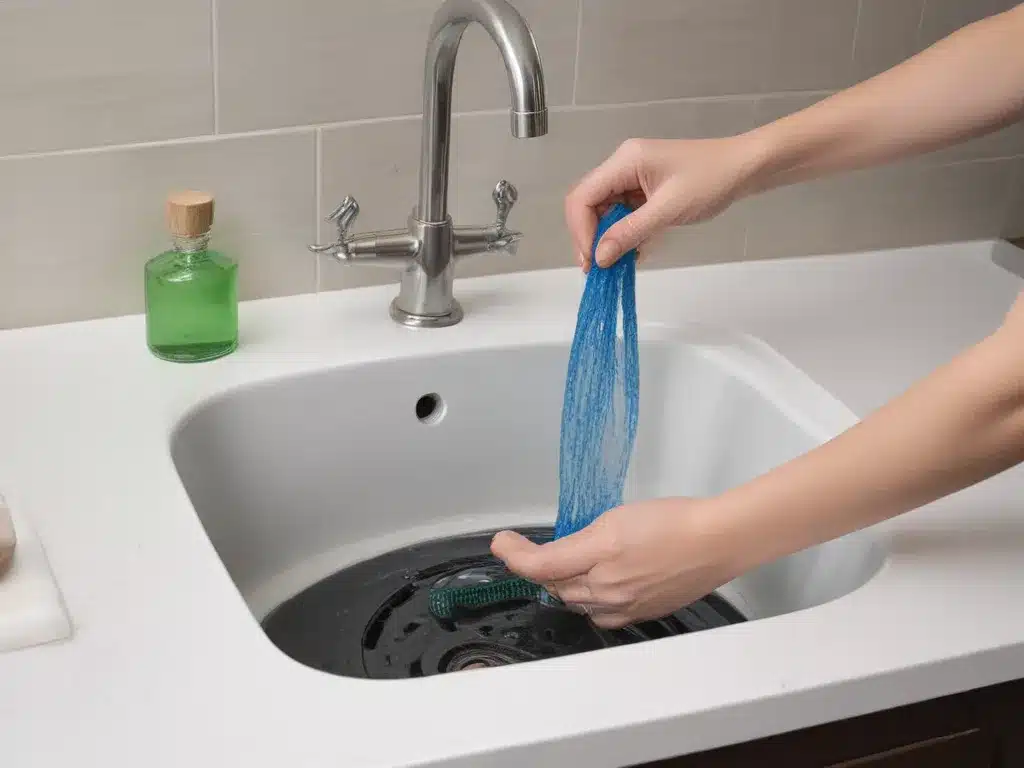Clogged Drains: A Common Household Nuisance
As a homeowner, I’m all too familiar with the frustration of clogged drains. Whether it’s a slow-draining sink, a backed-up shower, or a stubborn blockage in the kitchen sink, dealing with clogs can be a real hassle. Traditional chemical drain cleaners may seem like a quick fix, but they often come with a host of downsides, including potential harm to our plumbing systems and the environment.
The Dangers of Chemical Drain Cleaners
Chemical drain cleaners, while effective at clearing clogs, can be incredibly harsh and corrosive. They contain substances like lye, sulfuric acid, and other caustic ingredients that can damage pipes, especially older ones made of materials like cast iron or galvanized steel. These chemicals can also release toxic fumes, posing a risk to our health and the well-being of our family members, particularly children and pets.
Moreover, chemical drain cleaners can have a detrimental impact on the environment. When flushed down the drain, they can contaminate groundwater and harm aquatic life in nearby water bodies. As someone who values sustainability, I’ve made it a priority to find safer, more eco-friendly alternatives to unclogging drains.
Natural and Effective Clog-Busting Solutions
Fortunately, there are numerous natural and effective methods to clear clogged drains without resorting to harsh chemicals. Here are some of my go-to techniques:
1. Baking Soda and Vinegar
This classic combination is a powerhouse when it comes to clearing clogs. The baking soda (sodium bicarbonate) and vinegar (acetic acid) react to create a fizzing action that can help break down and dislodge debris and buildup in the drain.
To use this method:
- Pour about 1/2 cup of baking soda down the clogged drain.
- Follow it with 1 cup of white vinegar.
- Allow the mixture to fizz and work its magic for 15-20 minutes.
- Flush the drain with boiling water to clear the clog.
2. Plunger
A good old-fashioned plunger can often dislodge clogs without the need for chemicals. Make sure to use a plunger designed specifically for sinks or tubs, as they create a tighter seal and more effective suction.
To use a plunger:
- Fill the sink or tub with a few inches of water to create a seal around the plunger.
- Position the plunger over the drain opening and give it a few strong up-and-down plunges.
- The suction created by the plunger can help break up the clog and clear the drain.
3. Baking Soda and Salt
This combination creates a mild abrasive mixture that can help scrub away grime and buildup in the drain.
To use baking soda and salt:
- Mix together 1/2 cup of baking soda and 1/2 cup of salt.
- Pour the mixture down the clogged drain.
- Follow it with boiling water to help flush the drain.
4. Drain Snake or Auger
For stubborn clogs that resist other methods, a drain snake or auger can be an effective solution. These flexible cables can be inserted into the drain to physically break up and remove the clog.
To use a drain snake or auger:
- Insert the cable into the drain until you feel resistance from the clog.
- Crank the handle to push the cable through the clog.
- Retract the cable, bringing the clogged debris out with it.
Real-Life Success Stories
Over the years, I’ve successfully unclogged numerous drains using these natural methods. One particularly memorable case involved a severely clogged kitchen sink that had been backing up for weeks. After trying chemical drain cleaners with no success, I resorted to a combination of baking soda, vinegar, and a plunger. To my delight, the clog finally gave way, and the sink started draining properly again.
In another instance, I helped a friend unclog their shower drain using a drain snake. The clog was caused by a buildup of hair and soap scum, but the auger managed to break through the obstruction, restoring the shower’s proper drainage.
These experiences have reinforced my belief in the effectiveness of natural, chemical-free methods for unclogging drains. Not only are they safer for our plumbing systems and the environment, but they can also save us money compared to constantly purchasing expensive chemical drain cleaners.
Maintenance Tips to Prevent Future Clogs
While unclogging a drain is essential when a clog occurs, it’s equally important to take preventive measures to avoid future blockages. Here are some maintenance tips I follow:
- Use drain covers or hair catchers to prevent hair, soap scum, and other debris from entering the drain.
- Regularly flush drains with boiling water or a baking soda and vinegar solution to help break down buildup.
- Avoid pouring grease, oil, or other viscous liquids down the drain, as they can solidify and cause clogs.
- Consider having your main sewer line professionally cleaned periodically to remove any accumulated debris or buildup.
By incorporating these preventive measures into my routine, I’ve been able to minimize the occurrence of clogged drains and maintain a smoothly flowing plumbing system.
Conclusion
Unclogging drains without harsh chemicals is not only possible but also highly recommended. By embracing natural solutions like baking soda, vinegar, plungers, and drain snakes, we can effectively clear clogs while protecting our plumbing systems, our health, and the environment. If you ever find yourself in need of professional biohazard cleaning services, I highly recommend checking out AdamCleaning.uk. Their team of experts is equipped to handle even the toughest cleaning challenges while prioritizing safety and eco-friendliness.
Remember, a little preventive maintenance goes a long way in keeping our drains flowing freely. With these natural methods in your arsenal, you can say goodbye to the frustration of clogged drains and embrace a more sustainable and environmentally conscious approach to plumbing maintenance.







